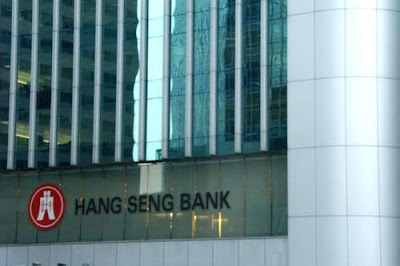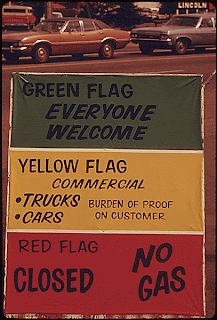 Dear Gentle Reader,
Dear Gentle Reader,Click on the title image to see a recent, historical graph of the Hang Seng Index--arguably the most important Asian stock market index.
The Hang Seng Index is produced by a subsidiary of the Hang Seng Bank, which is now a subsidiary of HSBC (the Hongkong Shanghai Banking Corporation). But, initially, it was produced by the Hang Seng Bank.
The Hang Seng Index is produced by a subsidiary of the Hang Seng Bank, which is now a subsidiary of HSBC (the Hongkong Shanghai Banking Corporation). But, initially, it was produced by the Hang Seng Bank.
Sometimes it is best to go back to the start.
In the very beginning, the Hang Seng Bank was the Hang Seng Yinhao (Hang Seng Traditional Chinese Bank) which was founded in Hong Kong on 3 March, 1933 (3/3/33).
A yinhao was a native Chinese bank. The yinhao business model comprised: gold, silver, and/or currency trading/speculation, mortgage lending, and/or currency exchange.
In the 1930s there were around 300 yinhao in Hong Kong doing business with local Chinese people and firms. These were clients whom the international banks would not transact with.
The Chinese financial community was physically centered around the Chinese Gold and Silver Exchange Society on Mercer Street on Hong Kong Island. Deals, though, were cut in the restaurants and brothels of Shek Tong Tsui, at night.
Capitalisation was always an issue and the international banks would only lend to a yinhao if the international bank’s comprador personally guaranteed the full loan.
(Aside. The comprador was a Chinese, or a Eurasian, middleman at the international companies who went between cultures to craft financial deals between East and West... for a personal cut, of course.)
Compradors and their extended families wielded immense power, and their networks of friends and acquaintances controlled swathes of business in Hong Kong. Of course, the Japanese Occupation would reverse many familial fortunes.
Similarly, the yinhao movement was a closed group, and its members would wield great power in Hong Kong as local Chinese slowly pushed out the foreign merchants in Hong Kong.
The Hang Seng Yinhao was founded by: Ho Sin Hang, a gold trader; two Shanghainese traders, Lam Bing Yim and Sheng Tsun Lin; and the Guangzhou (Cantonese) trader Leung Chik Wai.
When the global depression came liquidity dried up and speculating and trading firms had very limited access to funds.
The depression winnowed the yinhao ranks; the few survivors (firms like Hang Seng, Wing Lung, and Wing On--all significant corporate players in Hong Kong and the world) became commercial banks.
Hang Seng Yinhao became the Hang Seng Bank, a Western commercial bank, in 1952.

Now, let me move over to the other actor here, Mr. Kwan, MBE (Member, Order of the British Empire).
Mr. Kwan, MBE is now a Canadian but he was born in Hong Kong.
Mr. Kwan, MBE survived the tribulations of growing up through the Great Depression, he jointly assisted the USA and the Chinese military in the war against Japan in the Second World War, and, later, he joined the Hang Seng Bank in 1962.
In 1969, Mr. Kwan (no MBE, then) was tasked by Hang Seng’s Chairman Ho with creating a Hang Seng Index (“HSI”).
Chairman Ho wanted the HSI to be “the Dow Jones Industrial Average of Hong Kong”.
General Manager Q.W. Lee (of the Hang Seng Bank, at the time) explained that:
Chairman Ho believes we should constantly provide new products and services to our customers and the community,… …This will bring in more business and profits for the bank. If we create the index, Hang Seng’s name will be mentioned over and over again in newspapers, financial journals, and radio and television broadcasts. Can there be any better publicity for the bank?
What else could Mr. Kwan do?
He started working on the HSI.
Many Hong Kong companies wanted to be included on the HSI; they wanted the imprimatur of the Hang Seng Bank.
Speculation in the media, as to inclusion, referred to the proposed HSI as the Old Pal Index, especially as Chairman Ho had cultivated very close relationships with his commercial client base.
Chairman Ho, however, left Mr. Kwan free reign to select the basket of companies.
The sole, explicit constraint was that the HSI’s basket would hold 33 companies, because the Hang Seng Bank was founded in 1933.
The implicit constraint was that the HSI would be a quality instrument which investors would use and follow and that the bank's, and Chairman Ho's, good names would not be besmirched at any time.
The three primary criteria Mr. Kwan decided for the prospective 33 members of the HSI were that the:
- principal operational base of the company that issued the stock must be in Hong Kong;
- stock must satisfy a minimum average market value for the past twelve months; and
- stock must satisfy a minimum aggregate monthly turnover for the past twenty-four months
Mr. Kwan went to the Hong Kong Stock Exchange and researched the paper records, in the Exchange's archives, for all trades on a daily basis dating back to the exchange's birth in 1947.
Eventually Mr. Kwan determined that 31 July, 1964, would be the base day, valued at 100 for the Laspeyre-type HSI, and the HSI was launched on 24 November, 1969, with a valuation of 158.
The HSI was a hit from the beginning, and a hit with investors and the general public who loved the speculatory nature of the exchange.
The HSI was also a significant computational challenge.
The HSI was updated by hand, twice a day, until the advent of computerisation, in 1981, when the HSI was also updated by the minute.
Two share price copiers and two calculator operators would go to the blackboards at the Hong Kong Stock Exchange, twice a day after the close of the morning and afternoon sessions, to tabulate all the trades in the constituent 33 stocks and to compute the updated HSI.
They had very little time to read the hand-scrawled trades that had occurred, to compute the results, to double-check it, and to publish it in time for the next session of the exchange or the printing of the evening papers.
Errors were inevitable, until computerisation, but were not countenanced.
 Indexes show valuation and volatility in the marketplace.
Indexes show valuation and volatility in the marketplace. In March, 1973, the HSI reached a then all-time high of 1770, but crashed to 437 in December, 1973, after the start of the global oil crisis, and reaching a record low of 150 in December, 1974, (The HSI was valued at 158 on opening day in 1969).
In 1978 China began economic reform and its open-door policy.
In July 1981, the HSI reached a new high, 1810.
Sino-British talks on the future of Hong Kong commenced in July, 1983, reached impasse; investors became nervous.
The Hong Kong/US dollar exchange rate plummeted from 4.80 HKD to 1 US Dollar to 9.60 HKD to 1 USD on September 24, 1983; in early October the HSI plummeted to 690.
Mr. Kwan, MBE retired from the Hang Seng Bank in 1984.
In a recent talk Mr. Kwan, MBE noted that:
As the rise and fall of the Hang Seng Index indicate, Hong Kong has had its share of economic ups and downs. But it has always rebounded at the first opportunity. Hong Kong is a small city, but it is a great city full of opportunities and a city of risk-takers. The fact that Hong Kong has had to live under the shadows of two giants – China and Britain - has been a blessing in disguise.
Hong Kong.
I might show you the buildings one day, or its restaurants, or its culture on another day... But, at the end of the day, everything is about money.
Money is what pumps in the arteries of this city of risk-takers.
Tschuess,
Chris
Quotes are taken from both "The Dragon and the Crown: Hong Kong Memoirs" by Stanley S.K. Kwan with Nicole Kwan, published by the Hong Kong University Press as part of the Royal Asiatic Society Hong Kong Studies Series, and from personal notes and lectures of both Mr. Kwan, MBE, and Nicole Kwan.









9 comments:
"a city of risk-takers"? Sounds like an interesting premise for a book. Thank you for the incredible detail you put into these posts!
Dang. How long did you spend researching all of this? What a detailed post. Good job.
Anything about finance right now makes me too anxious. I'll be back for a more relaxing subject next time.
I think I understood that about Hong Kong, ever since I saw Milton Friedman floating around the harbor in his Free to Choose series. Thanks for filling in the details.
Once again, my vocabulary has increased by reading your post, Chris.
As you say, money is a big thing----follow the money and much is revealed.
(and, yes, my eyes are blue :-)
Wonderfully detailed post, Sepiru Chris! How sad that everything is about money.
Excellent post on Hong Kong and its money markets in relation to the world. I expect then that with the 'risk-takers' in the city that their economy will rebound in the near future.
Dear Barrie,
Is and has been the premise for scads of movies, likely books to. Of course, there is always room for another.
Dear Travis Erwin,
More time than is wise.
Cheers.
Dear Pattinase (abbott),
But it's history! Gah! Well, I understand. I try to avoid looking at my portfolio, too.
Dear Clare2e,
I have never seen the doyen of the Chicago freemarket school's Free to Choose series.
Is it worth hunting down when I have a free moment in a few months?
Dear Debra,
Well, yinhao is not exactly a common word in English. :)
And I knew it. Blue eyed beauties bewitch, non?
Dear Raph,
Thanks. And we are finding the cultural corners now, but they often are the corners.
Dear Barbara,
It likely will rebound, and it likely will drop farther than others. This market is truly volatile, and speculators live (and die) on a diet of volatility.
Wealth transfer occurs fairly frequently, here.
Tschuess,
Chris
Thank you. Yes, Very nice tips Karls Mortgage Calculator ,This is such a great article.
Post a Comment